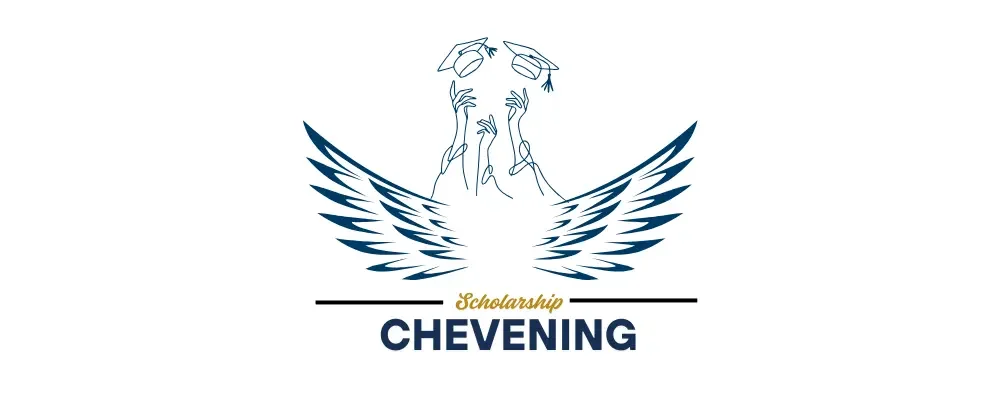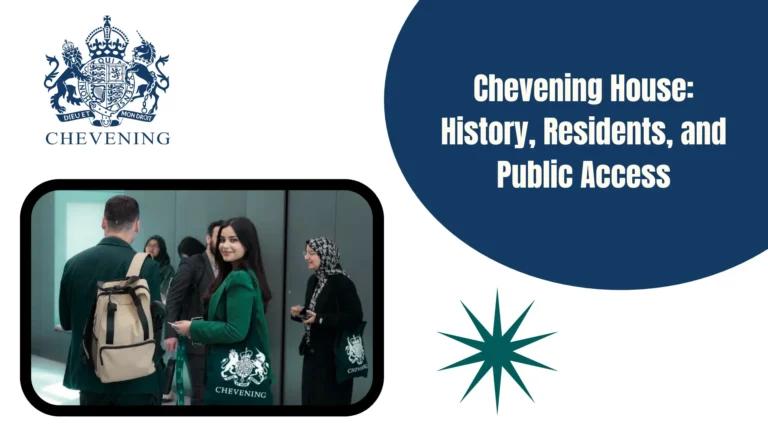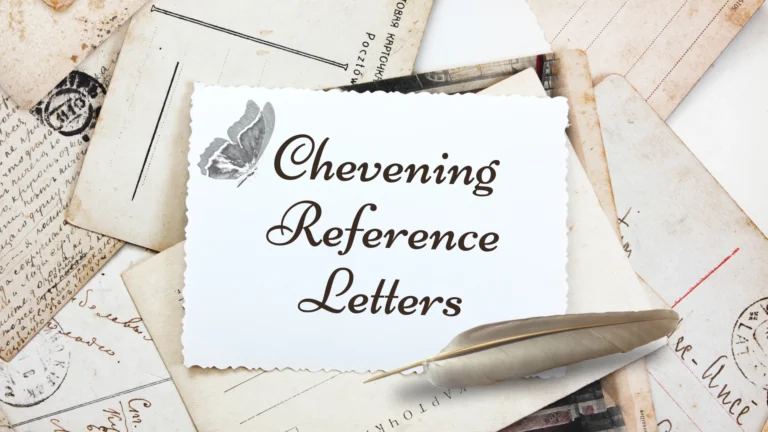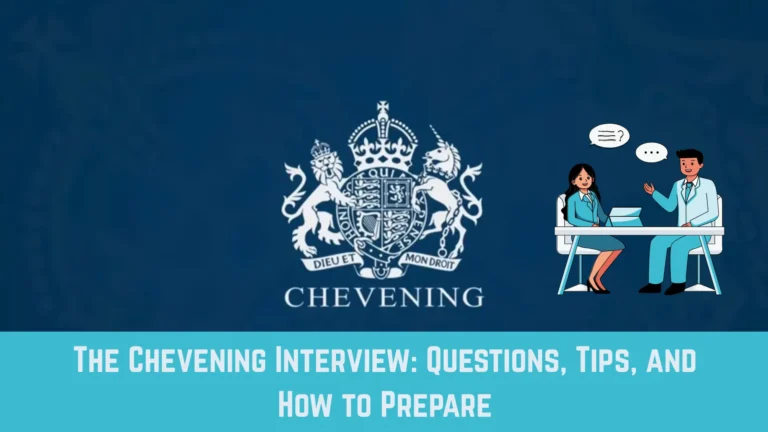Chevening Scholarships Eligibility for Pakistani Students: Your Complete 2025 Guide
Here’s something most Pakistani students don’t realize: Pakistan consistently ranks among the top five countries for Chevening applications. We’re talking thousands of talented, ambitious Pakistanis competing for roughly 30-40 scholarships annually.
Let that sink in for a moment.
You’re not just competing against your university classmates or your city’s brightest minds. You’re up against the entire country’s elite—from Karachi corporate lawyers to Peshawar development workers, from Lahore tech entrepreneurs to Quetta public policy experts.
But here’s the thing: Chevening scholarships eligibility for Pakistani students isn’t about being the absolute best in Pakistan. It’s about demonstrating you’re the right fit for what Chevening values, presenting your story compellingly, and meeting specific criteria that many overlook.
I’ve seen brilliant candidates get rejected because they misunderstood one eligibility requirement. I’ve watched underdogs with strategic applications beat seemingly perfect candidates. The difference? Knowing exactly what’s required and how to present it.
So let’s break down everything you need to know about Chevening scholarship eligibility Pakistan 2025—from the basics to the nuances that separate successful applicants from also-rans.
The Foundation: Basic Chevening Scholarships Eligibility for Pakistani Students
Let’s start with the non-negotiables. These are the baseline Chevening scholarship eligibility criteria Pakistan that you absolutely must meet.
1. Pakistani Citizenship (The Obvious One)
You must be:
- A citizen of Pakistan
- Hold a valid Pakistani passport
- Not hold British citizenship or dual citizenship with the UK
Common confusion: “I have UK indefinite leave to remain—can I apply?” Answer: No. If you have UK settlement status, you’re not eligible. Chevening is for people who will return to Pakistan after their studies.
“I’m a dual national with another country plus Pakistan—am I eligible?” Answer: Yes, as long as the other country isn’t the UK and you’re applying as a Pakistani citizen to your home country allocation.
2. The Undergraduate Degree Requirement
You need:
- A completed undergraduate degree (Bachelor’s or equivalent)
- Minimum qualification that allows entry to UK master’s programs
- From a recognized Pakistani university or international institution
Chevening scholarship eligibility Pakistan education specifics:
| Pakistani Qualification | UK Equivalent | Chevening Eligible? |
|---|---|---|
| 4-year Bachelor’s degree | Honors degree | ✓ Yes |
| 2-year Bachelor’s + 2-year Master’s | Master’s degree | ✓ Yes (for second master’s) |
| 3-year Bachelor’s | Ordinary degree | ✓ Usually yes, check specific universities |
| Professional qualifications (CA, ACCA) | Varies | Maybe—case by case |
| HEC-recognized degree | N/A | ✓ Generally yes |
Pro tip: If your degree is from a less-known institution, get your credentials evaluated early. Some UK universities require formal equivalency assessments.
3. Work Experience: The 2,800-Hour Rule
This is where many Pakistani applicants stumble. The Chevening scholarship experience requirement Pakistan is specific: 2,800 hours of work experience.
Breaking it down:
- 2,800 hours = roughly 2 years of full-time work
- Full-time = 35-40 hours per week
- Part-time work counts proportionally
- Experience can be accumulated over any timeframe
What counts for Pakistani applicants:
✓ Definitely counts:
- Full-time employment in corporate sector
- Government jobs (BPS officers, teachers, etc.)
- NGO/INGO positions
- Self-employment with verifiable business
- University teaching positions
- Research assistantships (paid)
- Internships (substantial, professional ones)
✗ Doesn’t count:
- Undergraduate coursework or projects
- Family business help without formal role
- Casual volunteering
- Unpaid internships that were primarily educational
- Student society positions
The Chevening scholarship eligibility Pakistan work experience calculation:
Real example from successful Pakistani applicant:
- 18 months full-time at development NGO = 2,520 hours
- 6 months part-time consulting (20 hours/week) = 480 hours
- Total = 3,000 hours ✓
Critical for Pakistani context: Many Pakistani graduates do informal work or family business. This is harder to document. If this describes you, focus on getting whatever formal documentation possible:
- Employment contracts
- Salary slips
- Tax documents
- Official letters from employers
- Business registration documents
4. The Return Requirement (Non-Negotiable)
Chevening scholarship Pakistan return home requirement:
- Must return to Pakistan for minimum 2 years after scholarship
- Cannot remain in UK for work immediately after
- This is legally binding
- Violations require scholarship repayment
Why this matters for Pakistanis: The brain drain concern is real. UK and Pakistan both want to ensure you’re returning to contribute. If your application suggests you’re using Chevening as immigration pathway, you’ll be rejected.
How to demonstrate commitment to returning:
- Specific career plans in Pakistan
- Named organizations or sectors
- Clear understanding of Pakistan’s development needs
- Existing professional networks you’ll return to
- Family or community commitments
Age, Education Level, and Other Technical Requirements
Chevening Scholarship Eligibility Pakistan Age Limit
Official position: No maximum age limit.
Reality for Pakistani applicants:
- Most successful scholars are 25-35 years old
- Younger than 23 is rare (need 2 years work experience)
- Over 40 is uncommon but possible with strong profile
- Age matters less than career trajectory and leadership potential
The sweet spot: 27-32 years old with 3-6 years progressive work experience.
Educational Level Specificity
Chevening scholarship eligibility Pakistan masters:
- Designed for master’s level study
- You must not already hold a UK-funded master’s
- Second master’s degree is fine (common for Pakistani applicants)
- Some Pakistanis already have local master’s—that’s okay
Chevening scholarship eligibility Pakistan PhD:
- Chevening does NOT fund PhD programs
- It’s exclusively for one-year master’s programs
- If you want PhD, look at other scholarships after completing Chevening
- Some confusion exists because similar UK programs do fund PhDs
Chevening scholarship eligibility Pakistan postgraduate:
- Must be postgraduate (master’s level)
- Postgraduate diplomas generally don’t qualify
- MPhil programs might qualify if they’re taught master’s, not research degrees
- Check specific program eligibility on Chevening website
The Application Process: Chevening Pakistan Application Process
Understanding how to apply for Chevening scholarship Pakistan is crucial. The process has specific steps and timelines.
Timeline for Pakistani Applicants
Typical annual cycle for Chevening scholarship deadline Pakistan:
| Month | Action |
|---|---|
| August | Applications open online |
| Early November | Application deadline (exact date varies) |
| December-January | Shortlisting, reference verification |
| February-March | Interviews in Islamabad, Karachi, Lahore |
| May-June | Final selections announced |
| September | Scholars depart for UK |
Chevening scholarship application deadline Pakistan 2025: Applications for 2025 entry typically close in early November 2024. Check the official website for exact dates—missing the deadline by even minutes means automatic rejection.
Step-by-Step Application Process
Step 1: Online Application (Allow 4-6 weeks)
What you’ll need:
- Personal details and education history
- Work experience documentation
- Four essay questions (500 words each)
- Three UK university course choices
- Two referee details
Pakistani-specific considerations:
- Use Pakistani email address (shows you’re Pakistan-based)
- Pakistani phone number with proper format
- CNIC number (often required for verification)
- HEC degree attestation details if applicable
Step 2: Reference Letters (Start 2 months early)
The Chevening scholarship references Pakistan process requires careful management.
Who to choose as referees:
✓ Good choices for Pakistani applicants:
- Direct supervisor at work (most important)
- University professor who supervised thesis/final year project
- Senior colleague who’s worked closely with you
- Head of organization where you’ve made significant impact
✗ Poor choices:
- Family members (obviously)
- Friends, regardless of their position
- People who barely know your work
- Very senior people who won’t remember you specifically
- Anyone who won’t submit on time (common issue in Pakistan!)
The late submission problem: This is huge in Pakistan. Many excellent applications get rejected because referees don’t submit on time. Pakistani work culture doesn’t always prioritize external deadlines.
Your management strategy:
- Ask referees 2 months before deadline
- Provide them with: your CV, key achievements, what to highlight
- Send weekly gentle reminders
- Have backup referees ready
- Use the portal to track submission status
- Consider visiting them in person if needed
Step 3: University Applications (Parallel process)
You must apply to three eligible UK universities. This runs separately from Chevening application.
Chevening scholarship courses Pakistan considerations:
Popular choices for Pakistani scholars:
- Development Studies
- Public Policy
- International Relations
- Economics
- Education
- Environmental Management
- Governance and Leadership
Strategy for Pakistani applicants:
- Choose one “reach” university (Oxford, Cambridge, LSE)
- Choose two “match” universities where you’ll likely get offers
- Ensure all three courses align with your stated career goals
- Consider living costs (London vs. other cities)
Step 4: Essays (Make or Break)
The four essays are where Chevening scholarship application tips Pakistan really matter.
Essay topics (consistent annually):
- Leadership and Influence
- Networking
- Studying in the UK
- Career Plan
Pakistani context for essays:
Leadership essay: Don’t just talk about your job title. Pakistani culture values hierarchy, but Chevening wants to see how you’ve influenced change regardless of formal authority.
Strong Pakistani leadership examples:
- Mobilizing your community for social initiative
- Leading cross-departmental project at work
- Founding or growing an organization
- Advocating for policy change
- Mentoring others in your field
Networking essay: Pakistani professional culture is relationship-heavy—leverage this! Talk about how you build and maintain meaningful professional relationships.
Studying in UK essay: Be specific. Don’t write generic praise of UK education. Explain:
- Why UK specifically (not US, Europe, Australia)
- Why these particular universities
- How UK system suits your learning style
- What specific resources/faculty/methodologies you’ll access
Career plan essay: This is critical. Your Chevening scholarship Pakistan career plan essay must show:
- Clear understanding of Pakistan’s development needs
- Specific role you’ll return to (or create)
- How your UK education fills current skill gaps
- Realistic timeline and milestones
- Measurable impact goals
Common mistakes Pakistani applicants make:
- Too generic (“I’ll help Pakistan develop”)
- Unrealistic (“I’ll become Prime Minister”)
- Vague (“I’ll work in development sector”)
- Immigration-suggesting (“I’ll gain international experience”)
Better approach: “I’ll return to my position at [specific organization] where I’ll implement [specific policy reform] focusing on [specific issue] in [specific region], leveraging the [specific skills] gained from my UK master’s.”
The Interview: Chevening Scholarship Interview Pakistan
If you’re shortlisted, the Chevening scholarship interview Pakistan happens in Islamabad, Karachi, or Lahore (occasionally Peshawar or Quetta).
Interview Logistics
What to expect:
- Panel of 3-4 people
- British Embassy staff + partners
- 20-30 minutes typically
- Professional but conversational
- Mix of prepared questions and follow-ups
Interview schedule: Usually February-March. You’ll get 1-2 weeks notice. The Chevening scholarship interview schedule Pakistan accommodates major cities but you may need to travel.
Common Questions for Pakistani Applicants
Chevening scholarship Pakistan interview questions often include:
General questions:
- Tell us about yourself
- Why Chevening, why UK, why these universities?
- What’s your leadership style?
- Describe a challenge you’ve overcome
Pakistan-specific questions:
- What’s Pakistan’s biggest development challenge?
- How will your degree address specific Pakistani needs?
- What’s your view on [current Pakistani political/economic issue]?
- How will you maintain your Chevening network from Pakistan?
- What if you get attractive UK job offers?
The return requirement test: They’ll probe your commitment to returning. Be prepared for:
- “What if you don’t find a suitable position in Pakistan?”
- “Wouldn’t it be better to gain UK work experience first?”
- “What about the brain drain issue?”
Strong answers acknowledge reality while showing commitment: “I understand the attraction of staying, but my goals are specifically tied to Pakistan’s context. The networks and knowledge I gain only have maximum impact if I’m working in Pakistan. Plus, I have family commitments and professional relationships I’m returning to.”
How to Prepare for Chevening Interview Pakistan
Preparation strategy:
1. Know your application inside-out They’ve read every word. Be ready to expand on anything you wrote.
2. Research current affairs
- Pakistani politics and economy
- UK-Pakistan relations
- Your specific sector developments
- Recent relevant policy changes
3. Prepare specific examples Use STAR method (Situation, Task, Action, Result) for behavioral questions.
4. Practice out loud Record yourself. Pakistani English has particular patterns—ensure clarity.
5. Dress professionally Conservative business formal. This is British Embassy environment.
6. Plan logistics
- Know interview location precisely
- Account for Pakistani traffic (leave extra early)
- Have backup transport plan
- Bring required documents
Chevening Visa Support: Everything You Need to Know About Getting Your UK Student Visa
Special Considerations for Pakistani Women
Chevening scholarship eligibility Pakistani women and Chevening scholarships for Pakistani women 2025 searches suggest specific concerns.
Is There Preference for Women?
Official position: No gender quotas, but they encourage women to apply.
Reality: Women are underrepresented in Pakistani applications but have strong success rates when they do apply. Chevening values diversity.
Addressing Common Concerns
Family and societal pressure: Many talented Pakistani women don’t apply because of family concerns about:
- Traveling alone to UK
- Living independently abroad
- Delaying marriage
- Safety concerns
How successful applicants navigate this:
Early family conversations:
- Involve family in research and planning
- Highlight prestigious nature of Chevening
- Emphasize career benefits
- Connect them with families of previous scholars
- Show safety measures and support structures
Leveraging Chevening community:
- Strong Pakistani women’s network among scholars
- Mentorship from alumni
- British Council can connect you with previous women scholars
- WhatsApp groups and support networks exist
In your application: You don’t need to address family concerns explicitly, but if relevant to your leadership or networking stories, authentic inclusion can strengthen your narrative.
Success Stories
Pakistani Chevening scholarship success stories include prominent women like:
- Government officials now in policy-making roles
- NGO leaders driving social change
- Academics influencing education reform
- Entrepreneurs creating impact businesses
Your story could be next.
Financial Aspects: What Chevening Covers
Chevening scholarship financial aid Pakistan and funding details:
Complete Coverage Breakdown
What’s included:
| Item | Coverage | Approximate Value (PKR) |
|---|---|---|
| Tuition fees | Full | 60-90 lakh |
| Monthly stipend | Living costs | 4.5 lakh/month |
| Return flights | Economy | 3-5 lakh |
| Arrival allowance | Settlement | 4.5 lakh |
| Visa costs | Full | 1.5 lakh |
| Travel grant | Academic events | 1.5 lakh |
| Total | 1-1.2 crore |
What’s NOT covered:
- Family members (spouse/children)
- Personal travel beyond flights
- Optional courses or certifications
- Luxuries beyond basic stipend
- Debt repayment or family support back home
The Stipend Reality for Pakistanis
The monthly stipend (£1,347) translates to roughly PKR 450,000 at current rates.
Cost of living perspective:
- More than many mid-level Pakistani salaries
- Sufficient if you budget carefully
- Tight in London, comfortable in smaller cities
- Covers rent, food, transport, basic entertainment
Budgeting tips from Pakistani scholars:
- Share accommodation with other international students
- Cook Pakistani food at home (huge savings vs. eating out)
- Buy from ethnic grocery stores (cheaper than mainstream)
- Use student discounts aggressively
- Avoid frequent international calls (use WhatsApp)
Chevening scholarship housing allowance Pakistan—there isn’t a separate housing allowance. The stipend covers everything.
Documents and Verification
Chevening scholarship Pakistan financial documents and other paperwork:
Required Documentation
At application stage:
- Passport copy
- Undergraduate degree certificate
- Transcripts
- IELTS/TOEFL (if required by universities)
At verification stage (if shortlisted):
- Employment certificates
- Salary slips or income proof
- Tax returns if self-employed
- Reference letters
- University offers (by July deadline)
Chevening scholarship Pakistan work experience verification:
- Formal employment letters on company letterhead
- Supervisor contact details
- HR verification contacts
- Salary slips showing duration
- Tax documents (if applicable)
Pakistani-specific challenges:
- Small organizations may not have formal HR
- Letterheads might be informal
- Some employers don’t provide detailed letters
Solutions:
- Get letters from highest authority possible
- Include as much detail as you can
- Provide multiple forms of evidence
- Supervisor can provide supporting statement
- Notarize documents if helps credibility
Common Challenges Pakistani Applicants Face
Chevening scholarships Pakistan challenges are real. Let’s address them honestly.
Challenge 1: Documentation Standards
Pakistani documentation doesn’t always meet UK standards.
Issues:
- Informal employment letters
- Inconsistent academic transcripts
- Lack of electronic verification systems
- Translation needs
Solutions:
- Get HEC attestation for degrees
- Use professional translation services
- Format documents professionally yourself if needed
- Provide context explanations where necessary
Challenge 2: English Proficiency
While Pakistan is English-medium educated, IELTS requirements trip up some applicants.
Reality:
- Many Pakistani universities require IELTS
- Standard requirement: Overall 6.5-7.0
- Must meet requirements by July deadline
- Some scholarships waive this if your degree was English-medium
Preparation:
- Start IELTS prep 3-4 months before
- Use British Council resources
- Take mock tests
- Focus on academic writing (often weakest area)
Challenge 3: Professional References
The Chevening scholarship Pakistan recommendations challenge is real.
Pakistani work culture issues:
- Hierarchical culture makes approaching seniors difficult
- People overcommit and don’t follow through
- Limited understanding of recommendation importance
- Late submission is culturally more acceptable
Your strategy:
- Choose referees who’ve worked internationally
- Provide clear deadline importance context
- Follow up more than feels comfortable
- Have contingency referees
- Consider visiting them in person
Challenge 4: Generic Applications
Pakistani students applying for Chevening scholarships often submit generic applications that could apply to any scholarship.
Why this happens:
- Limited guidance on differentiation
- Copy-paste from other applications
- Not researching Chevening’s specific values
- Focusing on need rather than fit
How to stand out:
- Research Chevening values deeply
- Tailor every word to Chevening specifically
- Show you understand UK-Pakistan relationship
- Demonstrate leadership through Pakistani lens
- Connect your goals to Chevening’s mission
Success Strategies: Learning from Those Who Made It
Chevening scholarship application success rate Pakistan is roughly 0.5-0.7%. Brutal odds. But people beat them every year.
What Successful Pakistani Applicants Did Differently
1. Started Early (6+ Months Before Deadline)
Successful applicants didn’t rush. They:
- Researched thoroughly
- Drafted essays multiple times
- Got feedback from multiple people
- Secured references months in advance
- Applied to universities early
2. Told Authentic Pakistani Stories
Winners didn’t pretend to be international. They:
- Used Pakistani context as strength
- Highlighted local challenges and solutions
- Showed cultural awareness and pride
- Demonstrated understanding of Pakistan’s position globally
- Connected local work to international impact
3. Showed Concrete Future Plans
Vague “I’ll help Pakistan” didn’t cut it. Winners:
- Named specific organizations they’d work with
- Identified particular policy gaps they’d address
- Showed research into Pakistan’s strategic plans
- Demonstrated existing networks they’d leverage
- Provided realistic timelines and milestones
4. Demonstrated Leadership Despite Hierarchy
Pakistani culture is hierarchical, but Chevening wants leaders. Successful applicants:
- Showed initiative even in junior roles
- Highlighted cross-functional influence
- Demonstrated thought leadership (articles, presentations)
- Founded or grew initiatives
- Mentored others despite age/position
5. Leveraged Pakistani Networks
Smart applicants:
- Connected with previous Pakistani Chevening scholars
- Joined Chevening Pakistan social media groups
- Attended British Council events
- Sought mentorship from alumni
- Built relationships throughout process
The Pakistani Chevening Scholars Network
Pakistani Chevening scholars network is powerful. Use it.
Connecting With Alumni
Where to find them:
- British Council Pakistan database
- LinkedIn (search “Chevening Pakistan”)
- Facebook groups (Chevening Pakistan Alumni)
- Professional associations
- Government and NGO sectors
How to approach:
- Be respectful of their time
- Ask specific questions
- Show you’ve done basic research
- Offer to meet their schedule
- Follow up with thanks
What to ask:
- Their application experience
- Interview preparation tips
- University choice advice
- Life in UK realities
- Return transition experience
Networking During Application
Benefits of connecting early:
- Real insights beyond official information
- Application review feedback
- Interview preparation help
- Emotional support during waiting periods
- Connection to UK Pakistani community
Addressing Misconceptions
Myth 1: “You Need Political Connections”
Reality: Chevening selection is merit-based. Political connections don’t help and might hurt (suggests you’re establishment-focused rather than change-focused).
Myth 2: “Only Lahore/Karachi Applicants Win”
Reality: Chevening actively seeks diversity. Applicants from smaller cities or underrepresented regions can have advantages if they frame their geographic context as strength.
Myth 3: “You Need Perfect English”
Reality: You need competent English, not BBC-level perfection. Authenticity matters more than accent or vocabulary sophistication.
Myth 4: “Certain Fields Are Favored”
Reality: Chevening funds all fields. What matters is your leadership potential and impact plan, not your degree subject.
Myth 5: “Women Have Lower Chances”
Reality: Women are underrepresented in applications but succeed at comparable or higher rates when they apply well.
Your Action Plan: Chevening Scholarship Preparation Pakistan
**Practical Chevening scholarship application guidelines Pakistan timeline:
12 Months Before Deadline
Actions:
- Research Chevening thoroughly
- Connect with previous scholars
- Identify potential referees
- Strengthen any weak areas (work experience, leadership evidence)
- Start IELTS preparation if needed
- Research UK universities and courses
6 Months Before Deadline
Actions:
- Request references formally
- Draft essay outlines
- Research your specific field’s landscape
- Identify your unique value proposition
- Start university applications
- Gather all documentation
3 Months Before Deadline
Actions:
- Complete essay drafts
- Get feedback from multiple readers
- Refine based on feedback
- Finalize university choices
- Ensure references are on track
- Prepare all supporting documents
1 Month Before Deadline
Actions:
- Final essay polishing
- Submit university applications
- Double-check all requirements met
- Follow up with referees again
- Prepare interview topics (in case of shortlisting)
- Submit application with time to spare
After Submission
Actions:
- Prepare for potential interview
- Research current affairs deeply
- Practice interview responses
- Continue professional development
- Maintain contact with referees
- Stay patient during waiting period
Final Thoughts: The Pakistani Advantage
Here’s something often overlooked: being Pakistani can be your strength in Chevening applications.
Your advantages:
- Rich, complex country context
- Clear development challenges to address
- Strong work ethic and ambition
- Meaningful leadership opportunities in challenging environment
- Authentic story of wanting to create change at home
- Cultural diversity and perspective to bring to UK
The key: Don’t see your Pakistani background as something to overcome. Frame it as the foundation of your unique contribution.
Chevening doesn’t want carbon copies of British students. They want leaders who’ll return home and create change. Your Pakistani context—with all its challenges and opportunities—is exactly what makes you valuable.
Chevening Scholarship Competition: The Brutal Truth About Your Odds (And How to Beat Them)
The Bottom Line
Chevening scholarships eligibility for Pakistani students comes down to this:
✓ You qualify if you:
- Hold Pakistani citizenship
- Have completed undergraduate degree
- Have 2,800+ hours work experience
- Will return to Pakistan for 2 years
- Can demonstrate leadership and impact
- Have clear, specific post-return plans
✗ You won’t qualify if you:
- Don’t meet work experience requirements
- Can’t return to Pakistan
- Want to immigrate to UK
- Don’t have undergraduate degree
- Miss application deadline
Your chances improve significantly if you:
- Start early and prepare thoroughly
- Tell authentic, specific stories
- Demonstrate genuine leadership
- Show clear commitment to Pakistan
- Apply strategically to universities
- Get strong, timely references
- Prepare meticulously for interview
The odds are tough. The competition is fierce. But Pakistani scholars win Chevening awards every year. They’re not superhuman—they’re strategic, prepared, and authentic.
You could be next.
Ready to start your Chevening journey?
Your next steps:
- Visit the official Chevening website and review current requirements
- Connect with Pakistani Chevening alumni on LinkedIn
- Start drafting your leadership and career plan stories
- Identify and approach potential referees
- Research UK universities in your field
Questions about Chevening eligibility for Pakistani students? Drop them in the comments below. Let’s build a community of support for Pakistani Chevening aspirants.
Current or former Pakistani Chevening scholars: Share your insights and tips to help the next generation. What do you wish you’d known when applying?
Remember: Every Pakistani Chevening scholar started exactly where you are now—reading guides, wondering if they’re qualified, hoping for their chance. They made it. You can too.







